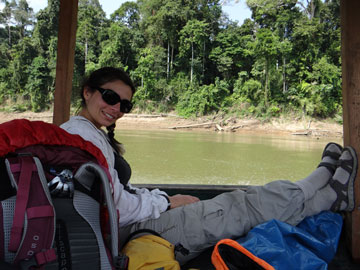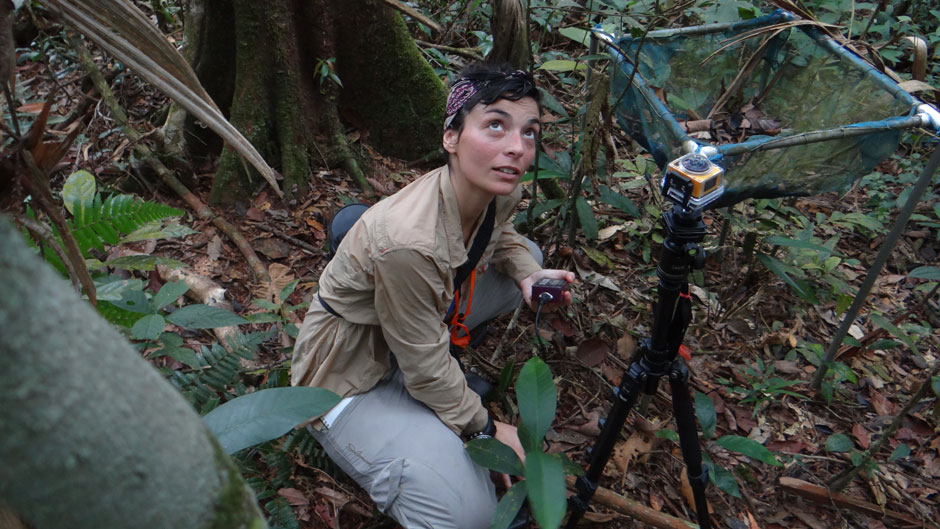Not many young scientists can say they’ve discovered a new species but Ph.D. candidate Belen Fadrique can say she’s discovered 16 of them—all in the bamboo family. While continuing her research on the new species she encountered during a recent field study trip in Peru, she’s thinking of the scientific names to give each one. “I am going to name one species after my grandmother,” Fadrique says.
A student of biology, Fadrique obviously loves talking about bamboo. “It’s a super interesting plant that nobody really thinks about,” she says. “People might have it growing in their backyards, but it doesn’t go much further than that. Also, most people associate bamboo as Asian, so they are very surprised when they learn about the abundance of bamboo in South America.”
Fadrique transferred to UM from Florida International University (FIU), where she began her Ph.D. under the guidance of Kenneth Feeley, who is now at UM as the College of Arts & Sciences’ Smathers Chair in Tropical Tree Biology.
“Professor Feeley is definitely a mentor, and he has been supportive throughout the whole process of my dissertation,” Fadrique says, “but there are many other professors and colleagues who play a very important role in my research, such as Lynn Clark at Iowa State University, Daniel Gann at FIU, or my lab mate Catherine Bravo.”
Fadrique is originally from Spain—far from the Amazon rainforest. As an undergraduate in Spain, she participated in a study abroad program in Scotland where she joined a field expedition to Peru, and found her calling.
 “Being in the tropics surrounded by so many different species of plants and animals was a life- changing experience for me,” she says. “You have no idea how dense and noisy the rainforest is until you’re there; it’s a completely different landscape than what I was used to. It was then that I knew I wanted to come back and conduct research in this part of the world.”
“Being in the tropics surrounded by so many different species of plants and animals was a life- changing experience for me,” she says. “You have no idea how dense and noisy the rainforest is until you’re there; it’s a completely different landscape than what I was used to. It was then that I knew I wanted to come back and conduct research in this part of the world.”
But Fadrique admits to having a love/hate relationship with the bamboo plants that she ardently studies.
“I find bamboo fascinating,” she says. “These bamboo species are native to the area, but they can have invasive behavior. If there is a landslide or a tree falls in the forest, the bamboo plants seem to aggressively take this opportunity to grow, and they do it much faster than any other plant. At the same time, some bamboos have very large thorns and form very dense stands, so it can be painful and difficult to walk around these forests.”
During the spring semester, Fadrique decided to take a chance and presented her research to strangers under pressure—by participating in UM’s 2018 Three Minute Thesis Competition (3MT). Her presentation on her dissertation, “Defining Bamboo As a Key Modulator of Andean and Amazonian Forest Functioning,” earned her first place and a $500 prize. The 3MT cup bearing her engraved name now sits in the college’s biology department.
“I think it’s easy to think about your thesis, but when someone asks you about it you tend to freak out because you don’t know where to start or how to give general answers,” Fadrique says. “There is so much information to talk about, which is why I thought it would be helpful to participate in the competition and see if I could highlight the important parts of my thesis in a short amount of time.”
Fadrique is the author or co-author of six research papers and the recipient of numerous research grants, from such entities as the Bamboo of the Americas, the Kushland Fund, the UM Institute for Advanced Study of the Americas, and the Programa Bosques Andinos, to name a few.

